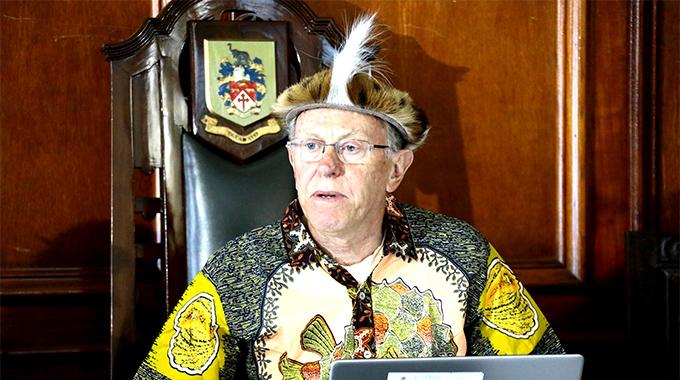News / National
David Coltart rejects colonial Mayoral 'relic'
11 Nov 2024 at 14:29hrs | Views

In a symbolic move to redefine Bulawayo's civic identity, Mayor Senator David Coltart has decided to forgo the traditional mayoral gown, which he described as a "colonial relic" that no longer aligns with the city's values and identity. Announced during a recent civic service, Coltart's decision reflects a commitment to reshaping local symbols to better honour Zimbabwe's cultural heritage.
Coltart explained that the gown, a vestige of colonial rule, doesn't resonate with Bulawayo's aspirations or cultural background. "This attire is part of our colonial legacy, and we need symbols that genuinely represent our people," he stated, urging for symbols that reflect the city's diverse and rich cultural heritage.
In place of the gown, Coltart has commissioned a locally-inspired garment crafted by women artisans from Matobo, an area celebrated for its traditional artistry. The new design will incorporate elements of Zimbabwean tradition and Bulawayo's unique cultural identity. "By having the gown crafted by women from Matobo, we're creating a piece that celebrates Zimbabwean identity and supports local talent," he added.
Coltart's initiative is part of a broader movement in Zimbabwe to replace colonial-era symbols with representations that align with African values and pride. The mayor's decision has garnered praise from residents and cultural advocates, who view it as a step toward fostering an authentic African identity within Zimbabwe's civic institutions.
The artisans of Matobo, known for their skill in traditional Zimbabwean motifs, are excited to bring their cultural expertise to the project. The new gown is expected to make its debut at upcoming civic ceremonies, showcasing a blend of tradition and modernity that speaks to Zimbabwe's evolving identity.
Coltart's move has sparked discussion throughout Bulawayo on the importance of cultural representation in civic life, with many seeing the initiative as a step toward unity and pride by bridging the past with a vision for the future. The redesigned gown may inspire other Zimbabwean cities to reexamine their own symbols and embrace locally meaningful representations.
Coltart explained that the gown, a vestige of colonial rule, doesn't resonate with Bulawayo's aspirations or cultural background. "This attire is part of our colonial legacy, and we need symbols that genuinely represent our people," he stated, urging for symbols that reflect the city's diverse and rich cultural heritage.
In place of the gown, Coltart has commissioned a locally-inspired garment crafted by women artisans from Matobo, an area celebrated for its traditional artistry. The new design will incorporate elements of Zimbabwean tradition and Bulawayo's unique cultural identity. "By having the gown crafted by women from Matobo, we're creating a piece that celebrates Zimbabwean identity and supports local talent," he added.
The artisans of Matobo, known for their skill in traditional Zimbabwean motifs, are excited to bring their cultural expertise to the project. The new gown is expected to make its debut at upcoming civic ceremonies, showcasing a blend of tradition and modernity that speaks to Zimbabwe's evolving identity.
Coltart's move has sparked discussion throughout Bulawayo on the importance of cultural representation in civic life, with many seeing the initiative as a step toward unity and pride by bridging the past with a vision for the future. The redesigned gown may inspire other Zimbabwean cities to reexamine their own symbols and embrace locally meaningful representations.
Source - byo24news





































